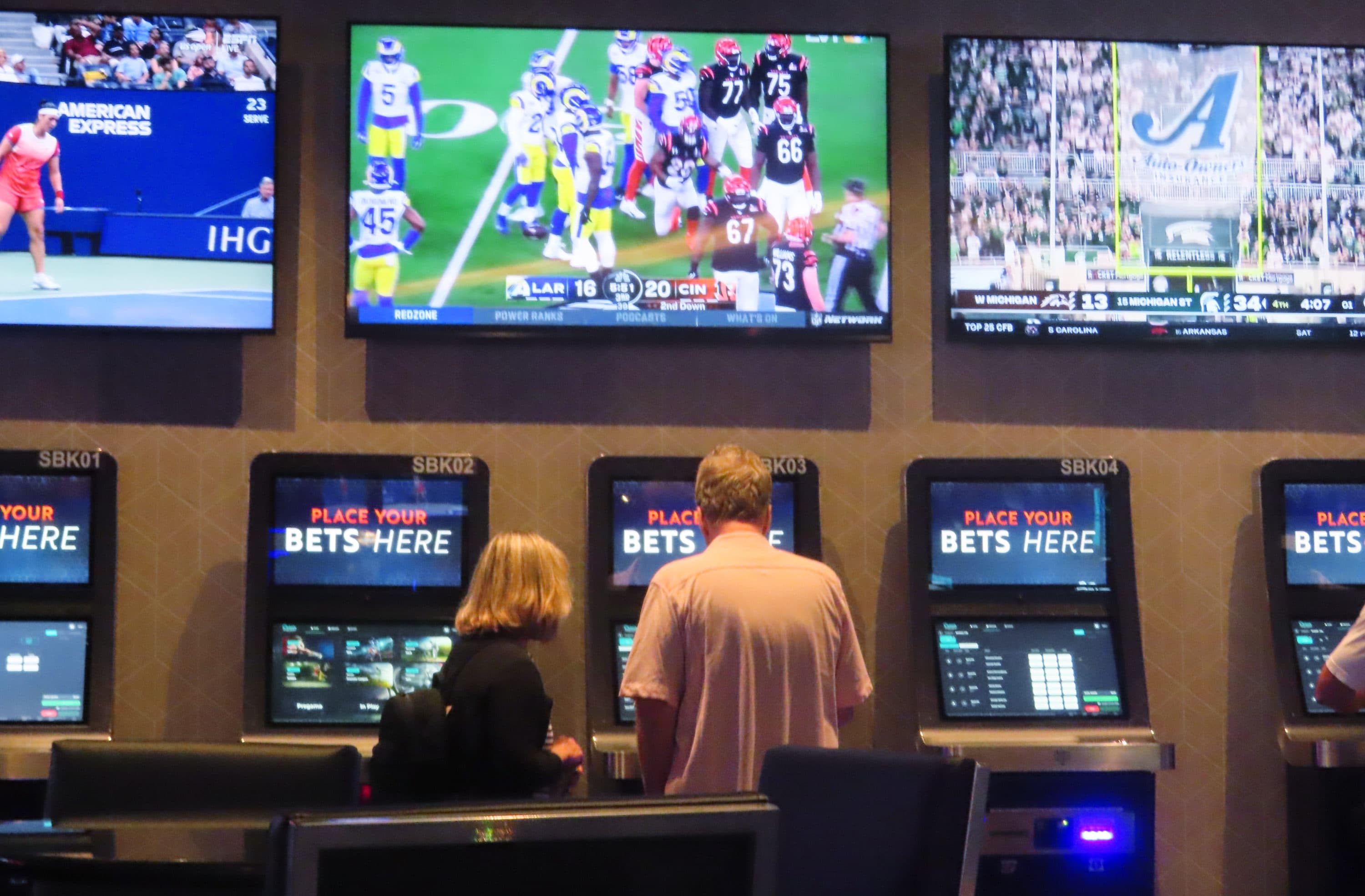Advertisement
Sports betting in Mass. ushers in new era of gambling, along with new social risks

A new era in gambling gets underway in Massachusetts this week. As of Tuesday January 31 at 10 a.m., sports betting in casinos will be legal in the state. Legal mobile sports gambling is set to start in the state in the following weeks.
Rachel Volberg is a research professor at the UMASS Amherst School of Public Health and Health Sciences, and she is the Principal Investigator on the Massachusetts Gaming Commission’s Social and Economic Impacts of Gambling in Massachusetts (SEIGMA) study.
Volberg spoke with WBUR’s Weekend Edition.
Interview Highlights
On expectations about the effects of the new law:
"We think the impacts are going to be moderate. But there are some groups that we think will be vulnerable because of their lack of experience with gambling or because they're being targeted very specifically by the sports betting operators in an effort to grow the market: adolescents, young adults, women, immigrants, college athletes and people who are already in recovery from a gambling problem."
On those most at risk of developing a gambling problem through sports betting:
Adolescents: "Adolescents don't usually have much experience with gambling. And with legalization, advertising is going to be happening and social media influencers will be influencing. Adolescents are going to follow those leads and…they are more likely to experience harm because of that lack of experience. Similarly with young adults, once they turn 21, they will be legally able to participate in this form of gambling, but they still will have relatively little experience."
Women: "The research that I've reviewed suggests that women are not necessarily very comfortable going into and staying in a physical sports book, something like at the casino. But since sports betting is going to be available online [soon] and women are much more comfortable gambling online, that is a concern. An additional concern is that I've seen quite a few indications in the literature and in the media that sportsbook operators are purposely targeting women to try and increase the proportion of the population that bets on sports. And again, because of their lack of experience, women may be more likely to get into difficulties."
Immigrants: "Their vulnerability relates more to their lack of comfort in a new culture. The fact that they don't speak English fluently or the fact that they don't have many outlets in their communities for recreation means that their recreational opportunities are limited. And so, they may be vulnerable because they don't have other opportunities for recreation."
College athletes: "I certainly am quite concerned about betting on college sports in general, because of what it means to the integrity of the games. But also college athletes who may get into trouble with gambling are quite vulnerable in terms of the kinds of support that their universities and colleges may be able to give them or willing to give them if they do develop a gambling problem."
People in recovery: "[I’m concerned about] the individuals who are already in recovery from a gambling problem. The strongest predictor of developing a gambling problem is having had one in the past."

On the nature of harm:
"From the research perspective, we distinguish between individual harms [and harms to the community]. Individual harms can include mental health issues, depression or anxiety, as well as physical experiences of stress. So those individual experiences [spread] to the family, because someone who's developing an issue with their gambling will spend more and more time... gambling and less and less time... with their friends and family. And then there's harms to the community which have to do not just with financial issues that an individual may cause in order to get money to gamble, but [situations that] can also affect their ability to be effective in school or at work, all the way out to committing financial crimes to get money to gamble. [And that can continue through] experiences of depression so severe that they will attempt or be able to commit suicide."
On the difficulty of facing a gambling problem:
"The biggest barrier that people face with respect to a gambling problem is that there's a great deal of stigma attached to people's relationship with money and people who have gambling problems. One of the main barriers to seeking help for them is that they're so embarrassed and ashamed at the idea that they haven't been able to take care of their finances."
"We need to understand that a gambling problem is not not only a financial problem, there's good evidence that the same brain mechanisms that affect people when they have an addiction to a drug or a substance like alcohol or nicotine, those same brain mechanisms work in the same way with gambling. And so it is an issue that people find it difficult to recognize and admit to for themselves."

On ways to fend off trouble:
"If you're concerned that you might be vulnerable to developing a gambling problem, how about not gamble? Let's find something else to do for someone who is becoming concerned about their own gambling. There are tools that are out there that people can put in place to set limits on the amount of time that they gamble."
"If you're becoming concerned about the gambling involvement of a friend or a family member, then having a conversation with that person — although it's very difficult —just expressing that your concerned and asking if you can be of help can very often start a conversation that can lead to that person getting some help if they feel that that's needed. [Or it can lead to the person] cutting back on their own because they realize that others are concerned about what they're doing."
On advice for a person who decides to give sports gambling a try for the first time and who wants to avoid problems:
"Go to the bank. Take out exactly how much you're willing to lose, which is going to be entertainment money. Take that money with you. Leave all your credit cards at home. Leave all of your cards that you use to access money at home before you go to gamble. Oh, and then another good idea is to not go alone, but to go with some friends and make one of them the designated non gambler, so they can gather everybody up at the end of the evening, get them all safely home."
Reach out for help:
If you or someone you know if struggling with a gambling problem, there are resources available to provide assistance.
- Call the problem gambling helpline: 1-800-327-5050
- Individuals can call 1-800-327-5050 or visit https://gamblinghelplinema.org to speak with a trained specialist to receive support. Specialists are available 24/7. Services are available in multiple languages and are free and confidential.
- The Massachusetts Department of Public Health’s Office of Problem Gambling Services and the Suicide Prevention Program launched an online free and anonymous screening tool for common mental health disorders, including problem gambling, on MassMen.org. The goal of this initiative is to strengthen the individual, family, and community connectedness of working-age men in Massachusetts. The screening tool provides individuals the opportunity to self-identify signs and symptoms, educate themselves on mental health topics, and connect with local resources in order to seek treatment.
Paul Connearney contributed to this report.
This segment aired on January 29, 2023.

